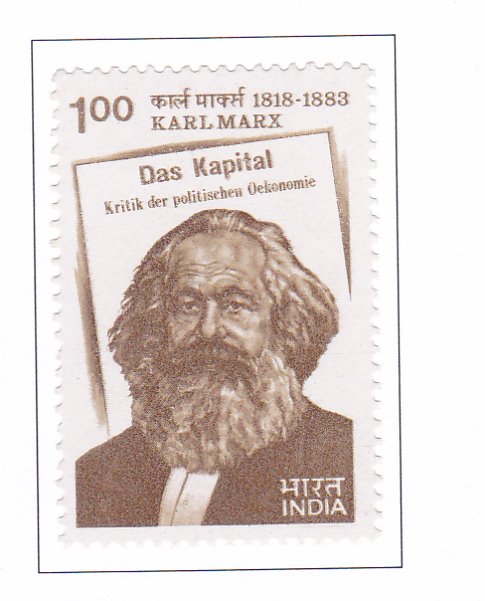Death Centenary of Karl Marx (1818-1883)

Technical Data
| Stamp Set | Death Centenary |
|---|---|
| Date of Issue | May 5, 1983 |
| Denomination | Rs. 1 |
| Quantity | 2,000,000 |
| Perforation | comb 13 |
| Printer | Security Printing Press, Nashik |
| Watermark | No Watermark |
| Colors | Multicolor |
| Catalog Codes |
Michel IN 950 Stamp Number IN 1017 Yvert et Tellier IN 761 Stanley Gibbons IN 1084 |
| Themes | Anniversaries and Jubilees | Books | Communism | Famous people | Men | Revolutionaries |
Karl Marx, born on May 5, 1818, in Trier, Germany, was the son of a lawyer. He received his early education in Trier and later pursued law at Bonn University, ultimately earning a degree from Berlin University in 1836. In 1841, he obtained a doctorate in Philosophy from Jena University with a thesis on “The difference between the Democritean and the Epicurean philosophy.”
Initially aligned with Young Hegelianism, Marx began his career as a journalist and later became the chief editor of Rheinische Zeitung. In 1844, he met Friedrich Engels, who became his closest friend and collaborator for life. Marx married Jenny Von Westphalen, from a Prussian noble family, in 1843.
After being expelled from Paris for his writings on the Silesian weavers’ uprising, Marx moved to Brussels, where he collaborated with Engels on various works, including “The Holy Family” and “The German Ideology.” In 1847, Marx joined the Communist League and, along with Engels, authored the Communist Manifesto, which outlined the principles of scientific socialism.
Throughout his life, Marx was involved in revolutionary movements across Europe, participating in democratic uprisings in Vienna, Frankfurt, and Berlin. He was deported from Germany, expelled from Paris, and eventually settled in London, where he closely observed and wrote about revolutionary movements, including the Paris Commune of 1871.
Marx’s writings also reflected his deep understanding of Indian society, particularly evident in his dispatches on the Indian Revolt of 1857 and his analysis of British colonial rule in India.
In 1864, Marx founded the International Working Men’s Association, also known as the First International. His seminal work, “Capital” (Das Kapital), was published in 1867, laying out the foundations of scientific communism, dialectical and historical materialism, and the theory of surplus value.
Karl Marx passed away on March 14, 1883, in London, and was buried in Highgate Cemetery. His contributions to political theory, economics, and sociology continue to influence thinkers and movements around the world. The Indian Posts and Telegraphs Department commemorates his 165th birth anniversary with a special postage stamp.
